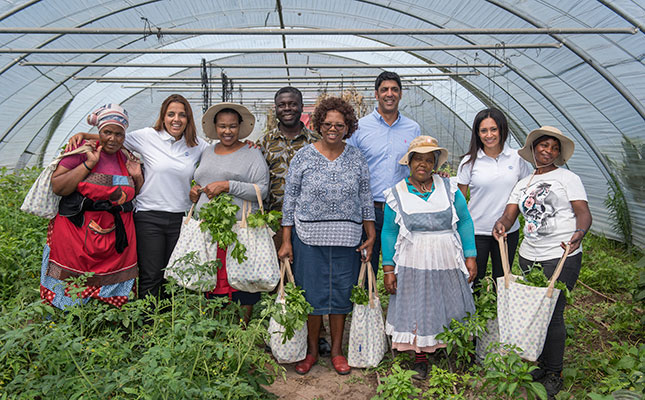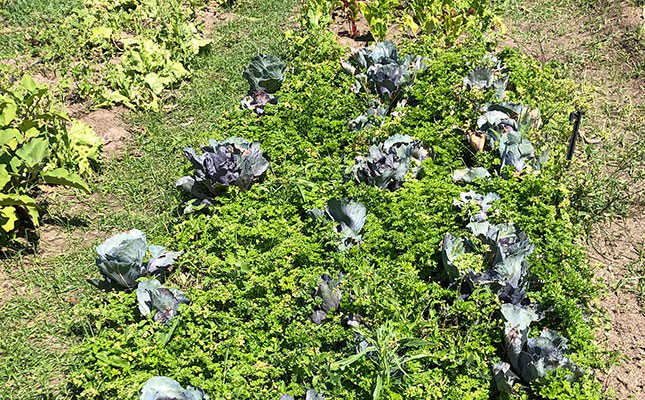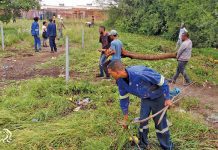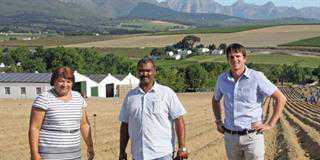
Photo: Jurie Senekal
The Siyazama Community Garden in Makhaza, Khayelitsha, in the Western Cape is an example of how the private sector can use agriculture to uplift communities.
The garden was started in 1997 by approximately 30 community members when they were given access to small patches of under-utilised land on municipal properties, according to Siyazama farmer Nokwanda Nkqayi.
“Initially, the members produced vegetables only for their own consumption,” she recalls.
This has changed, thanks to Agriplanner, a hands-on agricultural entrepreneurship programme run by Coronation Fund Managers and the South African Institute of Entrepreneurship.
The programme has provided entrepreneurial training such as farm enterprise planning, money management, co-operative management, dealing with markets, record-keeping and crop management.
Coronation’s support of the initiative started in 2004, when it provided seed funding to the Siyazama farmers through its Growing Entrepreneurs Programme. Today, the five women who took part in the programme run the Siyazama Community Food Garden, a fully organic, 1ha operation.
Agriplanner taught them new skills and turned them from struggling subsistence farmers into semi-commercial farmers.
“Working in the garden empowered me because I was previously unemployed, and now I have a variety of skills and a steady income. I was also able to send my kids to school,” says Nkqayi.
Organic farming practices
Siyazama’s farmers grow a variety of vegetables and herbs, including kale, cabbage, leeks, spring onions, spinach, brinjal and rosemary.
They have even begun experimenting with exotic vegetables such as okra and asparagus.
“We started planting okra in 2016 as we have identified a need among residents of other African nationalities,” says Liziwe Stofile, the garden’s coordinator.
“It did well under drought conditions. However, we’re still learning how to farm this vegetable.”
The exotic varieties, adds Stofile, diversify their offering and have the potential for higher profit margins.
Crop rotation
Thanks to Agriplanner, the farmers now follow a crop rotation system to break disease cycles.
“We also have a production schedule in place so that we know exactly what needs to be planted, not only according to the season and our clients’ needs, but also to ensure the growth of a range of crops,” says Stofile.
As the garden prides itself on being organic, no pesticides are used. To deal with pests naturally, the farmers plant pungent plants such as marigolds and rosemary, which act as insect repellents.
The farmers also use castor oil plants to make their own chemical-free pesticide to combat aphids.
“We harvest the leaves of the plant, then chop them up, soak them in water for two days and sprinkle them around the vegetables for aphids,” explains Stofile.
Nutrients are incorporated into the soil via fertigation in the form of manure, well before planting.
The planting of green manure crops helps reduce nutrient leaching, especially in sandy soil such as that found in the communuity garden.

To protect their produce against the wind, especially the South-Easter, which is particularly strong on the Cape Flats, the farmers have established hedges of indigenous plants as windbreaks. These also reduce evaporation and help protect the vegetables against wind abrasion.
Siyazama’s farmers can attest to the extent to which climate change has affected their lives. Stofile says that during the drought they had to rethink their farming practices, especially water usage.
“We have two boreholes, but had to adjust our water usage and implement strategies to better utilise our water,” she explains. “We irrigate our vegetables early in the morning and in the evenings when it’s cool, thus reducing evaporation.”
The farmers have also made a number of production changes to further limit their water use.
“We decided to reduce the planting of vegetables that need a lot of water, such as purple cabbage, broccoli and cauliflower,” explains Stofile.
When they do plant vegetables with a high water demand, they use living mulch, a cover crop interplanted with a main crop that assists in conserving soil moisture.
Living mulch retains moisture and reduces soil water evaporation. They plant purslane as living mulch between the vegetables, but use parsley amongst their purple cabbages.
A wide range of customers
Harvesting takes place weekly for formal markets. The farmers sell their produce to hotels, restaurants, retailers and families in the city through a vegetable box ordering programme. Whatever is left over is given to the sick and elderly.
Stofile says the vegetable box ordering programme has helped them learn how to
serve the market and which vegetables to plant.
“We’ve now seen the need to speak to the market first before cultivating the land.”
The farmers have also moved from subsistence farming to income-generation and participation in the formal economy, with each of the them earning between R8 000 and R12 000 a month.
Money in the soil
The farm has not only improved the lives of the five farmers, but provided some employment in the community, as the farm employs about eight people who assist in the garden on days when they are particularly busy, says Nkqayi.
The farmers also regularly recruit and train new women as part of their succession planning.
“Before, we didn’t know we could make money from the garden and did it for fun. But if there are markets, there’s money in the soil,” says Stofile.
Phone Nokwanda Nkqayi on 083 241 641.












